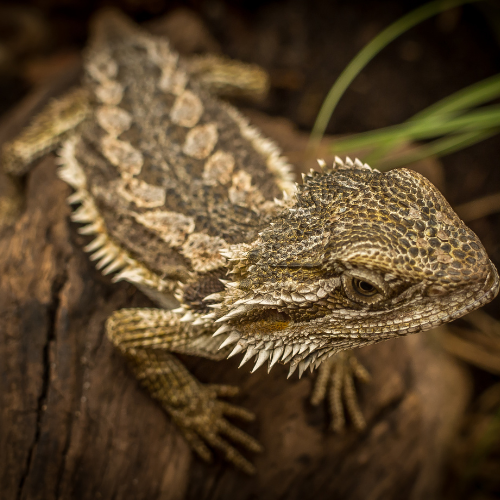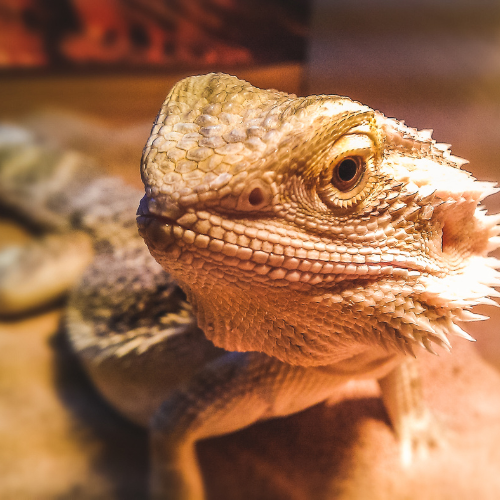Bearded Dragons are cute lizards that make attractive pets. Though reptiles are not the most amazing animals, they have unique personalities and traits. However, owners are often seen confused about the health of their beardies. New reptile owners can find it difficult to spot signs of illnesses in these tiny pets.

One of the concerns reported by bearded dragon parents is a cold belly. In this post, let us discuss why these reptiles can get too cold and whether you should be worried about it.
Bearded Dragon’s Belly Cold? Here’s What It Means
Bearded dragons require a large enough vivarium with heat regulation and ventilation to thrive well in captivity. Owners sometimes complain that they feel their pet’s belly too cold to touch and are concerned about their health and wellness. There can be several reasons why the reptile’s belly can get cold.
As you may already know, a huge difference between reptile pets and others is that the former are cold-blooded. This means that unlike other animals like mammals, the body temperature of a reptile does not regulate itself but keeps fluctuating with the surrounding. Therefore, they need an external source of heat to survive.
If the bearded dragon gets too cold, it is no longer able to perform its everyday tasks optimally. It may slow down and find difficulty moving and digesting food. Such issues can cause long-term damage to the pet or can prove to be fatal.
However, a cold belly does not indicate the reptile is too cold. It is important to remember that they are naturally cooler to touch than warm-blooded animals. As long as the vivarium is large enough with adequate heat, it should be able to thermoregulate itself. If the pet eats well and looks active and happy, there is no need to worry about a cold belly.
Symptoms of Bearded Dragons Being Too Cold
As bearded dragons are cold-blooded, they depend on external heat sources to have their bodies functioning properly. If the encloser doesn’t have the optimal temperature or lacks a heat source, the beardy can get too cold and start showing sluggish behavior. Not only does it slow down the movement but also experiences problems with other everyday functions like going to the bathroom.
One of the biggest symptoms of being too cold is difficulty digesting food. A slowed-down or stopped digestion process can be life-threatening for your pet. When they cannot digest food, it starts rotting in the stomach which can prove to be deadly for your reptile.

Another symptom of staying cold for too long is drowsiness. If not warmed up quickly, a bearded dragon can continue to sleep and not wake up. However, this is more likely to happen if it is exposed to cold for over 24 hours; a shorter exposure should not cause a lot of concern if addressed immediately.
Understanding Brumation in Bearded Dragons
Bearded dragons and other cold-blooded reptiles adopt a hibernation-like state in winter which is called brumation. When bearded dragons brumate, they seek an insulated spot where they remain for a period. Their heart rate, respiration rate, body temperature, and activity level reduce during brumation. They become sluggish and less interested in food.
Most bearded dragons don’t brumate until they are 10-12 months old and may or may not brumate every year. Not all bearded dragons brumate in captivity and it can occur in seasons other than winter. The duration of brumation varies depending on several factors and you can learn its cycle through time and experience.
Can Bearded Dragons Eat Cicadas? UPDATED 2022 – A Complete Guide
Is Your Bearded Dragon in Brumation or Sick?
Brumation is a common process seen in reptiles like bearded dragons but the behaviors associated with it can be concerning for pet owners as they overlap a lot with the symptoms of serious health problems and dying processes. During brumation, your pet’s appetite reduces to a great extent due to dropped metabolism, causing changes in its awake time and energy level.
As the body of a bearded dragon is naturally designed to suit the seasonal changes in the wild, it is likely to feel cool to the touch during brumation from seeking cooler spots in the vivarium. This can make it cooler than it would normally feel off the basking rock but should not be a matter of concern. To find out if your bearded dragon is brumating or sick, you should look for some obvious signs of sickness like a change of color, tail rot, dark-colored beard, or drastic weight loss.
If your pet is sick, it may not show movement. To check whether it is brumating, you can consider placing it gently on its back. It will make an attempt to get it right even when it is in brumation. On the other hand, a sick reptile would appear to be lethargic and inactive.
Bearded Dragon Cold at Night? Here’s What to Do
The body temperature of bearded dragons depends greatly on the temperature changes around them. They cannot keep themselves warm without an external source of heat when the temperature in their surrounding falls at night. This means the temperature in the beardy’s tank can decrease at night and make it cold.
It is natural to get concerned if you find your bearded dragon cold at night. Whether it is due to an electricity issue or failure of heat sources, it is important to be prepared with options to warm up the pet quickly. One of the best ways to ensure your reptile stays warm at night is to use a heating mat. You should also consider adding a ceramic heat-emitting bulb or a night glow lamp in the tank which keeps its habitat warm without any light at night.
Another way to keep your bearded dragon from getting too cold at night is to increase the temperature of the room where the beardy’s tank is. If the tank is large, you can consider putting multiple heat sources and adjusting them to keep it warm during the night. When you find your pet getting extremely cold, you should consider warming it quickly by keeping it close to your body or using a grain pillow.
Bearded Dragon Scale Rot – UPDATED 2022 – A Complete Guide
Final Thoughts
A bearded dragon stands out from other pets because of its cool feature but requires extra care and attention to ensure its optimal health and well-being. If you feel your reptile’s belly to be cold, it can be due to various reasons though most of them demand no concern. As long as your pet moves well and remains active, there is no need to worry. However, checking the surroundings and analyzing its signs and symptoms helps keep your little beardy safe.

Doctor of Veterinary Medicine (D.V.M.) at Nation Taiwan University,Master of Science (M.S.) in Biomedical Engineering at National Taiwan University of Science and Technology




